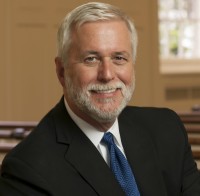My mother was my first theology teacher
Now it’s my turn to hold the memory of faith for her.

It was my mother’s 90th birthday party, held in one of those restaurants called something like “The Abbey.” The restaurant moved into an old church building after the congregation moved out or died out. My mother spent her entire adult life as a church lady, so I couldn’t figure out if my brother and I had found the perfect setting for her party or the worst one. My mother, like the church building, is not what she used to be.
Since her last stroke, dementia frequently overwhelms her, leaving her unsure of the people and the world around her. But often something trivial will break through the clouds, and she’ll cling to it by talking about it over and over. I recently spent more than an hour listening to her remind me that February is a very short month. Sometimes she doesn’t know my brother and me, though more often she just gets us mixed up.
Read our latest issue or browse back issues.
Other family and friends joined us at the restaurant. Mom was happy to be there, I think, but it bothered her that she wasn’t clear about her responsibilities. It was painful to watch this genteel southern woman, who was once the pastor’s wife and who always had exactly the right gracious response, struggle as she tried to be the hostess for her own birthday party.
At one point she stood behind her walker and offered a well-rehearsed one-minute speech. “I love you and pray for you,” she said several times. And then she offered some bad theology about how God keeps a record of when we say we’ll pray for someone but do not. “We’re supposed to do what we say we’ll do,” she said.
I understood her struggle to say something appropriate and to recover her cherished self-image as a leader of a church Bible study. But she broke my heart when I heard her trying to teach us about divine record keeping. That’s not something she used to say.
Like Timothy in the New Testament, my brother and I learned a great faith on the lap of our mother. I have no idea when exactly I realized I was a Christian, because she taught me that our faith in a God of grace was just as true as the sky above me. She was my first theology teacher, teaching me about a merciful savior who forgets our sins. That was then.
My father was a fundamentalist pastor. He was charismatic but also troubled and dangerously volatile. Mom’s life with him was hard and loveless. Somewhere along the way she decided it was her calling to protect her boys from him. So she didn’t just teach us faith; she also sacrificed her life for what she believed she was called to do. In her day a pastor’s wife couldn’t run away with her children. By the time we were almost grown, she was nearly destroyed by this “calling,” and so she made a desperate choice to walk away. Alone.
Ever since, my brother and I have been trying to give her absolution and even support for her decision to leave. It’s been a tough sell. After she left us she turned toward the judgment side of our faith and settled in there.
We keep trying to help her see that even her desperation pointed us back to the enormity of her gift of a great faith. Our father left shortly after she did, and we two boys took on the world on our own. But we always knew that when we passed through the deep waters God would be with us. Mom taught us that. The faith held us when she no longer could.
These days the meaning of the faith appears to be slipping away from her. When she “goes into Bible teacher mode,” as my brother and I say, she doesn’t make a lot of sense. Her inspiration from Jesus, her guilt, and even her cardiologist’s advice get intermingled as the gospel. The only message that breaks through is her broken heart.
So now it’s our turn to hold the grace for her. That’s the way a family of faith works. And it’s why we have church.
Our faith has never been about her faith or my faith. If in the end faith was about what “I believe,” then it would be up to me to end life with a peak of inspiration and theological insight. But what if we peak sooner than our years endure? What if at the end we are not as much as we used to be? What if we need someone else to hold our memories of grace before our years of failure run out?
Over the years, as a pastor, I’ve lost track of how many times I have taken communion to people with some form of dementia. What does it mean to “do this in remembrance of me” when someone has run out of remembrances? It means the memory of Christ can never be contained by the mental capacities of any of its members. Sometimes the community of faith holds the memories of saving grace for us.
It’s not that different when a congregation vows in a worship service to hold the faith for an infant that was just baptized. Then we are waiting for the child to grow into belief. At the other end of life, we’re receiving the faith back from those whose memories are too worn out to hold their belief. The great faith belongs to the church, and we’re always holding it for someone.







